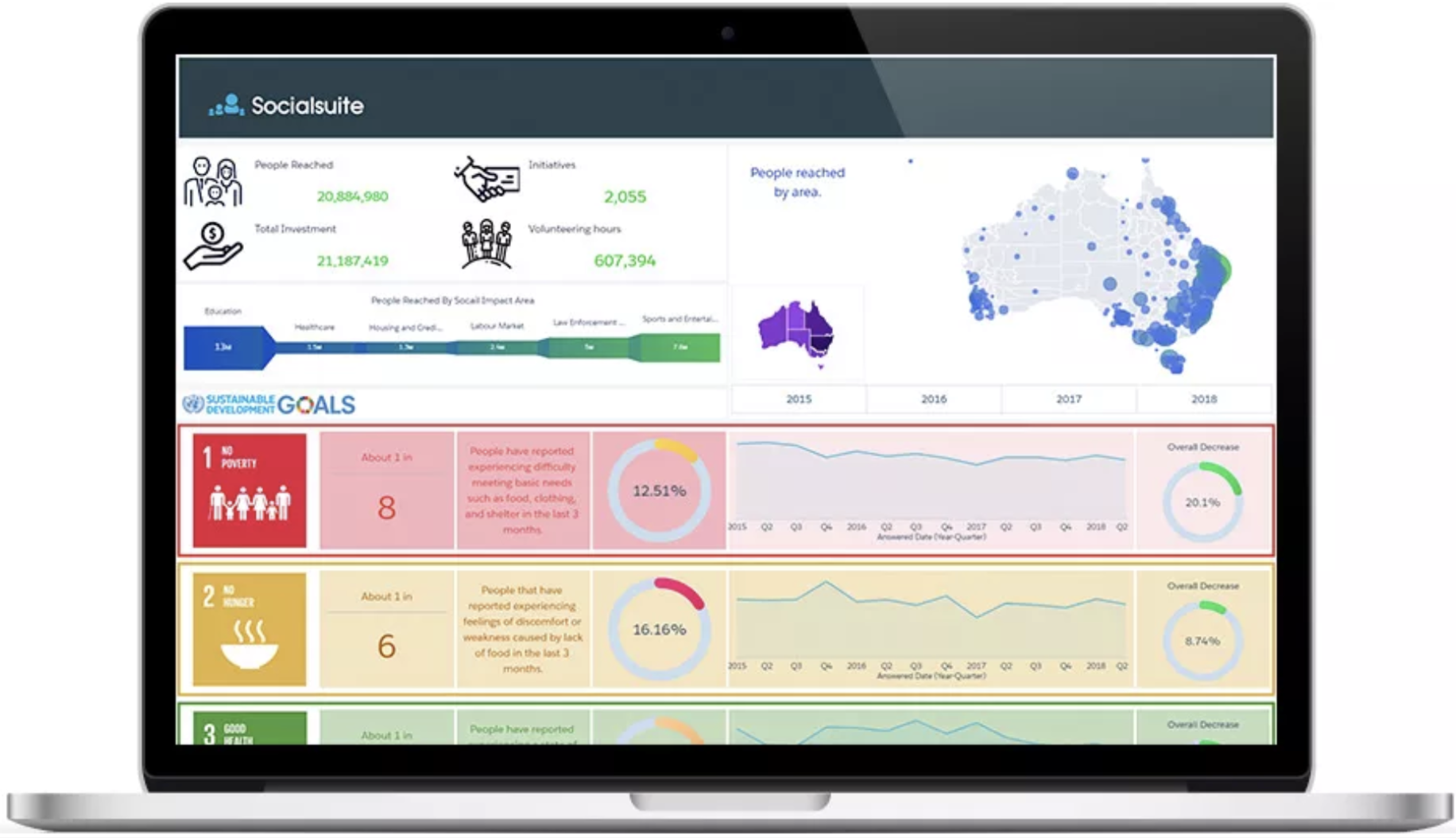Disclosure: This post is sponsored by Socialsuite.
Robust impact management can help organizations meet their social goals, while minimizing the risk of doing harm.
Despite best intentions, many organizations delivering programs and services to benefit the community often fail to realize they are not making any headway at all. Worse, they may not know that their interventions have done more harm than good.
For corporations and government agencies, the failure of well-intentioned community projects and the possible wastage of funds can lead to substantial reputational risk or brand damage. An organization that neglects to monitor and measure its social, economic and environmental impacts risk losing the trust and support of its key stakeholders and communities.
There is no reason for failing to closely monitor what is happening. Robust systems are available that can help organizations of all sizes, and in many different circumstances, measure constantly and instantly the performance of their social investments.
>>Download: Socialsuite’s whitepaper on why your organization needs impact management software.
Melbourne-based Socialsuite, which recently raised $A1.85 million to further grow its global business, has developed a comprehensive, bespoke data collection-and-analysis platform that helps organizations monitor and measure their impact. With a rapidly-growing customer base, Socialsuite’s technology is proving to be in hot demand.
Co-founder Dr Clara Ong says the range of organizations – not-for-profits, government agencies, large corporations and more – that are using Socialsuite’s platform is testimony to just how important the discipline of impact management has become. It is now a vital management tool, one that is increasingly required in boardroom presentations.
“Our software helps management gather strong evidence on the impact they are having on society,” Dr Ong says. “What makes Socialsuite’s platform so different is that it can work with any Impact Management methodology or measurement metric.”
Ask, analyze, action
Put simply, an organization that wants to measure the practical effect of its investment in a social program can electronically collect data through surveys or other methods and analyze, at various intervals, all those who are directly affected by its intervention.
The questions to ask and the data to collect can be based either on internationally accredited measurement methodologies or utilize the organization’s own impact measurement considerations. Socialsuite’s flexible platform allows organizations to collect responses in the field, in remote locations and via mobile devices, and over various time periods. The results can be tallied immediately, analyzed electronically and organized graphically to correlate with whatever key performance indicators the organization might require.
“An organization might have a really robust metric that could go into Socialsuite’s platform, or it might have something as simple as a five-question survey devised by the customer themselves,” Dr Ong says. In other words, the methodology that underpins the measurement can be as simple, or as layered and multi-dimensional, as the organization needs.
What distinguishes Socialsuite’s platform is the depth of data analysis. Its impact measurement and analysis system is built specifically for the customer’s purpose, and it can provide live monitoring of longitudinal data derived from multiple stakeholders. Analytical results are generated in a dashboard format — in comprehensible, visually appealing and instantly accessible graphics. Key performance indicators can be charted at snapshots in time or over many years.
That depth of analysis is vital for organizations to determine if their particular social investment projects remain in their current form, perhaps incorporate some adjustments or, if necessary, are terminated. Socialsuite calls it an ‘Ask, Analyse, Action’ platform.
Turnkey solution
“It’s important to understand that Socialsuite is not merely a survey tool,” Dr Ong says. “It is an end-to-end platform. We enable our customers to determine what they want to measure – that’s what makes us different.”
Dr Ong cites the case of a Socialsuite customer, Scope, which provides a range of services for disabled people, and is one of the accredited providers of disability services under Australia’s burgeoning National Disability Insurance Scheme.
“Scope not only wanted to evidence the impact of their own disability services, but also help other disability providers measure and prove their impact. To help with this, they developed a set of proprietary and researched-backed impact measurement metrics.”
With the goal of using technology to globally scale the uptake of their metrics and data collection, Scope partnered with Socialsuite to deliver a turnkey solution for their client base.
Another example of Socialsuite’s technology in practice is its work with the YMCA’s Bridge Project, which aims to reduce the likelihood of recidivism for youths who have been through the state’s juvenile justice system. The Bridge Project provides training, job opportunities and mentors for young offenders to improve their lives on release from detention.
The beneficiaries involved in this particular project are spread throughout the state and would rarely, if ever, be all in the same place at the same time. The Socialsuite platform enables the YMCA Bridge Project to dispense with paper-based surveys about how the youths are engaging with the project, and to analyze in a variety of formats exactly what impact the initiatives are having.
Dr. Ong says that as directors increasingly are personally liable for the performance of their organization, it is their fundamental obligation to ensure they are aware of how social investments are performing.
“Clear and timely reporting gives them a degree of additional assurance that their organization is meeting its goals accurately, efficiently and ethically,” she says.











